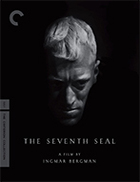The Seventh Seal (Det sjunde inseglet) (4K UHD)
|  The Seventh Seal (Det sjunde inseglet) is, without doubt, the most iconic of Swedish master Ingmar Bergman’s canon of masterpieces, and it is also quite possibly one of the most powerful and memorable examples of late ’50s and early ’60s European art cinema, a film that, in so many ways, encapsulates the philosophical insight, visual creativity, and all-around artistic daring that made Hollywood cinema, despite its widescreen Technicolor images and multi-track stereo sound, seem so dull, stodgy, and safe. It had taken Bergman some time to arrive at this place—17 films, in fact, although he had already made his international mark with the romantic lark Smiles of a Summer Night (Sommarnattens leende) in 1955. Nevertheless, The Seventh Seal fully announced his presence as a major international filmmaker, an artist who was capable of working a specific and arguably limited narrative (a medieval morality play) into something that was both intimate and epic, but, most importantly, universal. The story, which was inspired by the medieval church frescoes by Albertus Pictor, takes place in 14th-century Sweden, opening with the return of a well-meaning, soul-searching knight named Antonius Block (Max von Sydow) and his carnal, earthly squire Jöns (Gunnar Björnstrand). The film’s opening shots of a dramatically cloudy sky scored to Erik Nordgren’s intense choral music immediately establishes that there is more at stake in the story than just life and death: There are issues of eternal questioning and suffering and, to put it simply, the meaning of it all. After 10 wasted years in the Crusades, Antonius is in desperate need of answers, but all he finds on the rocky beach is Death (Bengt Ekerot), who has come to collect him. However, Antonius manages to buy time by convincing Death to play him in a game of chess, which stretches out over several interludes and allows Antonius to view firsthand the state of humanity in his native country, which is in a pit of despair as the black plague ravages the coastlines and threatens to move inland. As Antonius and Jöns travel across the countryside, the encounter a number of characters who represent different aspects of humanity. Much of the story takes place in a small village that is threatened by the encroaching plague, which is driving the villagers to extremes of fear and paranoia. Bergman encapsulated this desolation most vividly in a scene in which a lighthearted theater performance is interrupted by a procession of despondent men and women who march through the village flagellating themselves and each other and dragging with them enormous wooden crosses as a sign of penance because they believe that the plague is a direct act of God meant to punish them. Bergman also captures the desperation that drives society to isolate and scapegoat others in an excruciating sequence in which a young girl (Maud Hansson) with a soft, childlike face is to be burned alive for witchcraft. Yet, although its reputation is built on its stark depiction of death and decay and its generally austere mood (it is, after all, a film that Bergman said he made to confront his own fear of death), The Seventh Seal is not at all the dark slog it would seem to be. As Peter Cowie wrote in his original liner notes for the Criterion Collection laser disc, “At first glance, the film would appear insufferable. It is set in the Middle Ages at a time when the Plague was ravaging Europe, orthodox religion was locked in the battle with paganism and the disillusionment brought about by the Crusades, and it describes a Knight’s doomed attempt to forestall death. Yet nearly everyone who sees The Seventh Seal emerges stunned and thrilled by its visual splendors, and inspired by one or other of the major characters.” What often gets lost in the surface memories of Bergman’s first true masterpiece is the wit and the comedy and the human warmth that gives context to all the violence and pain. Although it features Death as a literal character, The Seventh Seal is a film about life and the importance of human connection, a lesson that Antonius learns when he crosses paths with a traveling theater troupe led by a juggling musician named Jof (Nils Poppe) and his beautiful and dedicated wife, Mia (Bibi Andersson). When thinking about the film, the images that first pop into the mind are usually the darkest: Antonius and Death playing chess against the backdrop of a sullen ocean, the aforementioned parade of self-flagellating monks, and the child-witch strung up to burn. Yet, the film’s most important sequence takes place on a sunny hillside and involves the sharing of a “humble meal” of wild strawberries and fresh milk, a moment of familial bliss and neighborly generosity that comes to define the true meaning of life for Antonius. Similarly, the film is brimming with witty and meaningful exchanges among the characters, including a conversation between Jöns and a fresco painter (Gunnar Olsson) whose defense of his gory images might very well work as the ultimate defense of horror movies. Jöns also has an amusing, if somewhat mean-spirited, exchange about the nature of women with Plog (Åke Fridell), a dejected and anger-management-impaired blacksmith whose lusty wife (Inga Gill) has absconded with one of Jof’s actors (Bertil Erik Strandmark). In these sequences we can sense The Seventh Seal’s origins on the stage (it was based on a one-act play Bergman wrote in the early ’50s), yet the film itself never feels in any way constrained, despite the fact that it was shot on a relatively tight budget over 35 days almost entirely on soundstages and a small backlot that Bergman and cinematographer Gunnar Fischer (with whom Bergman worked on 12 films) effectively use to create a sense of epic grandeur befitting the film’s intensive philosophical inquiries. The fact that The Seventh Seal still speaks with such power and clarity nearly seven decades later is testament to both its artistic prowess and its fundamental humanity.
Copyright © 2023 James Kendrick Thoughts? E-mail James Kendrick All images copyright © The Criterion Collection | |||||||||||||||||||||||||||||
Overall Rating: 


 (4)
(4)


